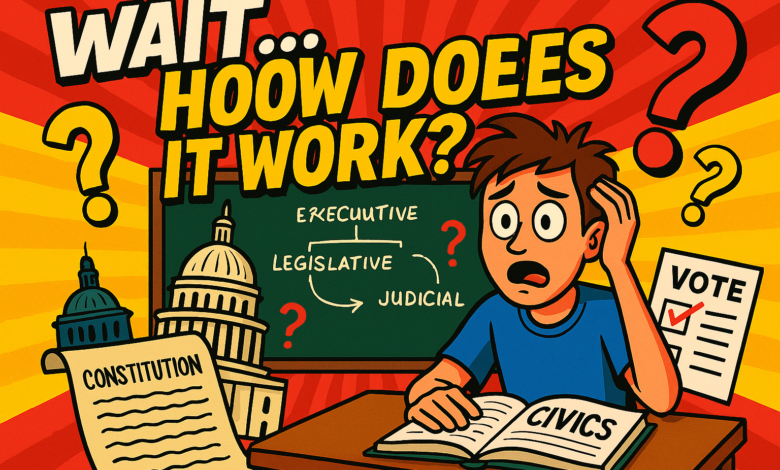Shocking Number of College Students Have Little Idea How Government Works — Why It Matters More Than Ever

In a world overflowing with information, you’d think that the next generation would be more politically aware than ever. But the latest research and surveys say otherwise. A shocking number of college students today have only a vague or superficial understanding of how government actually works.
Yes, you read that right. The same students who can navigate TikTok algorithms, dissect pop culture debates, and argue passionately online about justice or rights… often can’t explain what Congress does or how a bill becomes law.
So, what’s really going on here?
📚 The Civic Knowledge Gap: A Quick Snapshot
Multiple studies have highlighted that civic knowledge among young adults is at an all-time low. Whether it’s failing to identify the three branches of government, misunderstanding the electoral process, or not knowing how local and federal laws interact — many college students are simply out of the loop.
Even students in prestigious universities often stumble on basic questions like:
- What does the Supreme Court actually do?
- Who represents them in the House or Senate?
- What is the role of the Vice President?
It’s not just embarrassing — it’s alarming.
🧠 Is It a System Failure or Cultural Shift?
Here’s where the debate begins.
📘 Argument 1: The Education System is Failing
Many experts argue that the decline in civic literacy starts in high school (or earlier). Civics education has been pushed aside in favor of standardized test prep, STEM subjects, or generalized social studies.
- Civics classes are often optional, outdated, or rushed.
- Teachers may avoid political topics to steer clear of controversy.
- Students aren’t taught how to think politically, just what to memorize for a test.
This leaves students underprepared for real-world democracy.
📱 Argument 2: Digital Distraction & Political Fatigue
On the flip side, some blame the internet culture itself.
College students today are bombarded with headlines, hot takes, and hashtags, but rarely do they get clear, structured education on how systems work. Social media teaches them what to be mad about — not how the system can actually change.
Plus, after years of political chaos, many feel burned out and disillusioned. The result? A generation that cares deeply about issues… but feels powerless to understand or fix them.
🧭 Comparison: Yesterday’s Voter vs. Today’s Student
Let’s compare how civic understanding has shifted over generations:
👵 Yesterday’s Voter:
- Likely to have taken a required civics course in high school
- Watched nightly news or read the paper regularly
- Voted locally and nationally
- Trusted institutions (even if skeptically)
👩💻 Today’s Student:
- Might learn politics from TikTok or YouTube clips
- More focused on social justice and identity politics
- Knows what issues are trending, but not who to hold accountable
- Distrusts government deeply — sometimes without knowing how it functions
This shift isn’t just cultural—it’s structural.
❓Why Does It Matter?
This isn’t just an academic concern. Democracy literally depends on an informed citizenry. If young voters don’t understand how power works, they:
- Can’t hold leaders accountable
- Don’t vote in local elections that directly affect their lives
- Are easily misled by misinformation or oversimplified narratives
- Lose trust in systems they never truly understood
And with younger generations becoming the largest voting bloc, this lack of knowledge could weaken democratic participation for decades.
🌐 Can Social Media Be the Fix?
Surprisingly, there’s hope — and it might come from the same platforms that distracted students in the first place.
Pages like Civics101, @sharonsaysso, and Crash Course Government on YouTube are creating digestible, engaging civic education content tailored to younger audiences.
Memes, short-form videos, and explainers are being used to break down:
- How impeachment works
- What happens in a runoff election
- Why local government affects your rent and roads
In other words, if the classroom won’t do it, content creators will.
But it’s not enough.
🛠️ What Needs to Change?
To bridge this civic gap, here’s what experts and educators suggest:
- Reintroduce mandatory civics classes — early and often
- Make civic education relatable, issue-based, and interactive
- Teach how systems work alongside why they matter
- Encourage real-world simulations like mock trials, debates, or model UN
- Use tech platforms wisely to meet students where they are
🗳️ Final Verdict: Civic Ignorance Isn’t Just a College Problem — It’s a National One
The lack of civic understanding among college students isn’t a trend we can ignore or meme away. It’s a red flag. If we want tomorrow’s leaders to be informed, thoughtful, and engaged, we need to rethink how we teach government—before it’s too late.
So the next time someone shrugs and says, “I don’t really get politics,” don’t just roll your eyes. Instead, ask: Did anyone ever teach them?




